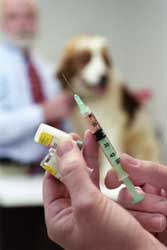
A change to this yearly vaccine protocol was championed in 1978 by Dr.Ronald Schultz, a pioneer and expert in the field of veterinary vaccines. That year, Dr. Schultz and a colleague, Dr. Fred Scott developed and published a new vaccination protocol calling for pets to receive puppy or kitten shots, be vaccinated again at a year of age, and then be re-vaccinated every three years or less frequently thereafter. But, it was not until 2003 - a full 25 years later - that veterinary vaccination protocols actually changed, and they incorporated many of Dr. Shultz's initial recommendations. It now is standard to have vaccine titer testing performed, and if a titer is lower than a normal range, the dog is vaccinated. Otherwise, the veterinary protocol indicates that the dog may not need to be vaccinated again for three years (or longer). Dr. Shultz's recommendation was that if the titers continue to be within normal levels, no vaccination need EVER be administered to the dog, ignoring the 3 year recommendation.
Core canine vaccines for all dogs are considered to be Distemper, Parvovirus, Adenovirus-2 and Rabies (mandated by state law to be given by 6 months and then a booster dose the following year, with repeat doses every three years for the life of the dog). These core vaccines are for diseases considered to be life-threatening for dogs and transmittable to other animals. The effectiveness of these vaccines is considered to be at least 7 years, and may even confer lifetime immunity. This means some dogs may never require re-vaccination for these diseases. Reducing the need for yearly vaccinations helps in the reduction of side effects linked to vaccination, including skin problems, allergic reactions and autoimmune diseases.
All others vaccines are considered non-core vaccines or optional, meaning administration should occur after the pet owner discusses options with the veterinarian. These include vaccines for kennel cough, Lymes disease, coronavirus, leptospirosis, etc. Using these non-core vaccines depend on the pet's location, activities, and owner's lifestyle. And, the non-core vaccines are considered to have a reduced duration of effectiveness, requiring yearly or more frequent vaccination. If you live in the northeastern US you and your dog both have a higher likelihood of exposure to Lymes or other tick-borne diseases. You may need to consider a Lymes vaccination for your dog if you live, hunt or train in areas highly infested with ticks, or if your dog has been infected previously. If you need to board your dog frequently you may be required to vaccinate your dog (intranasally, not by injection) for Bortadella or kennel cough infections, so you need to discuss this with the vet to be sure you are optimally protecting your dog. Owners who take their dogs to conformation and performance events also may want to consider a kennel cough vaccine, and the recommendation may be for a twice-yearly administration for this vaccine.
Now that core vaccines have been standardized and injections reduced, current research is focusing on reducing the use of rabies vaccine, and Dr. Shultz and Dr. Jean Dodd are both active in the Rabies Challenge Fund. The challenge is to demonstrate the rabies vaccine imparts immunity to rabies for longer than 3 years, and that revaccination every 3 years is unnecessary. There is an ongoing Rabies Duration of Immunity 7 year study nearing completion in the next year or two. After the results are analyzed, it is hoped that a recommendation can be made to perform rabies vaccines at 3-6 months and then not require re-vaccination for another 7 years. However, since each state sets its own rules, the change may be difficult to enact since it will have to go through the political process in all 50 states. Dr. Schultz talks about the rabies research in a Youtube video, and there is a transcript of his interview here.
For our own dogs, our vet hospital relies exclusively on titers to determine whether a dog gets a core vaccination as an adult. Most of our dogs have never needed additional vaccination after their initial puppy shots, with the exception of rabies and non-core vaccines. Even our 12 year old dog has not been revaccinated. The key to the vaccination protocol is that the titers must be monitored every three years (or more frequently), and we are happy that our vets agree with Dr. Schultz's recommendation that there may be lifetime immunity imparted by the initial puppy vaccines. For puppies that we raise, we use a modification of Dr Jean. Dodds protocol. We start puppy shots at 6 weeks of age, and then follow her recommendations for 9 and 14 week vaccinations and rabies by 5-6 months, with titers starting at 1 year and repeated every 3 years thereafter (and again, you can do them more frequently if you want confirmation of the dog's immunological status).
 RSS Feed
RSS Feed